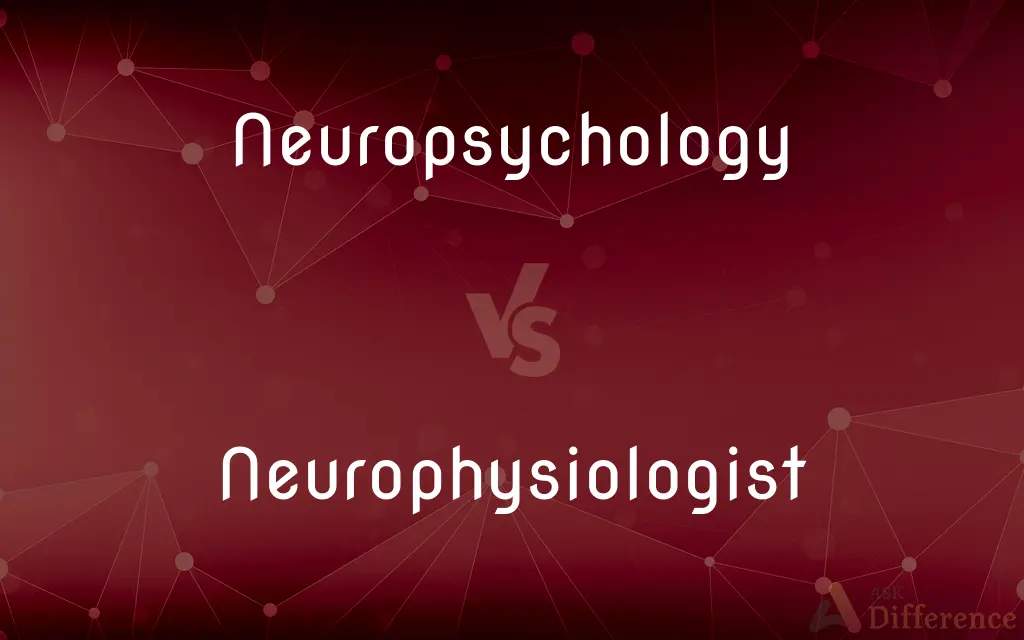Neuropsychology vs. Neurophysiologist — What's the Difference?
By Maham Liaqat & Fiza Rafique — Updated on March 12, 2024
Neuropsychology focuses on understanding brain-behavior relationships and cognitive functions, while a neurophysiologist specializes in studying the nervous system's functions and mechanisms.

Difference Between Neuropsychology and Neurophysiologist
Table of Contents
ADVERTISEMENT
Key Differences
Neuropsychology is a field that merges the insights of psychology with neurology to understand how brain structures and functions relate to behavior and cognition. It involves assessing and interpreting cognitive functions and behavioral outputs, aiming to understand how various brain regions contribute to psychological processes. On the other hand, a neurophysiologist is a specialist, often with a medical or research background, who focuses on the physiological aspects of the nervous system. They study how nerve cells and neural networks operate, often employing sophisticated technologies to monitor and analyze the nervous system's electrical and chemical activities.
While neuropsychologists are typically involved in clinical assessments, diagnoses, and treatments of brain-related cognitive and behavioral issues, neurophysiologists might work in more research-oriented or clinical settings to explore the underlying mechanisms of neural activity and its relation to diseases and disorders. Whereas neuropsychologists use tests and evaluations to understand brain function in relation to behavior, neurophysiologists may utilize techniques like EEG, EMG, and nerve conduction studies to investigate the nervous system's workings.
Neuropsychology's scope often includes working with patients suffering from brain injuries, neurological diseases, or cognitive impairments, applying therapeutic strategies and interventions to aid recovery or manage conditions. Conversely, neurophysiologists might focus on a broader range of nervous system functions, exploring areas like sensory perceptions, motor control, and the physiological bases of neurological disorders, often contributing to developing treatments or interventions based on physiological findings.
The tools and methodologies in neuropsychology include cognitive tests, behavioral assessments, and neuroimaging to link psychological functions with brain activity. In contrast, neurophysiology heavily relies on electrophysiological measurements, animal models, and in vitro studies to understand the electrical and chemical properties of neurons and their networks.
Despite their different approaches and focuses, both neuropsychology and neurophysiology contribute significantly to our understanding of the brain and nervous system. They offer complementary perspectives, with neuropsychology providing insights into how brain function affects cognition and behavior, and neurophysiology uncovering the fundamental biological processes that underpin neural function.
ADVERTISEMENT
Comparison Chart
Focus
Understanding brain-behavior relationships and cognitive functions.
Studying the physiological functions and mechanisms of the nervous system.
Main Activities
Clinical assessments, diagnoses, and therapeutic interventions for cognitive and behavioral issues.
Research and clinical studies on neural activities and nervous system disorders.
Tools and Methods
Cognitive tests, behavioral assessments, neuroimaging.
EEG, EMG, nerve conduction studies, animal models.
Work Setting
Often clinical, dealing with patients with brain injuries or cognitive impairments.
Can be clinical or research-oriented, focusing on the broader nervous system functions.
Contribution
Links psychological processes with brain structures and functions.
Explores the electrical and chemical properties of neurons and their networks.
Compare with Definitions
Neuropsychology
The study of brain-behavior relationships.
Neuropsychology helps in understanding how a stroke can affect memory and language.
Neurophysiologist
Focuses on the mechanisms of neural activity.
Neurophysiologists use EEG to record brain activity during sleep.
Neuropsychology
A field focusing on cognitive functions and their brain origins.
Neuropsychologists assess patients with Alzheimer's to determine the extent of cognitive decline.
Neurophysiologist
Employs electrophysiological measurements for research.
Neurophysiologists measure nerve conduction speed to diagnose neuropathies.
Neuropsychology
Involves therapeutic interventions for brain-related issues.
Neuropsychology uses cognitive rehabilitation to help brain injury survivors.
Neurophysiologist
A specialist in the physiological functions of the nervous system.
A neurophysiologist may study how neurons communicate during learning.
Neuropsychology
Uses neuroimaging to link brain areas with specific cognitive functions.
Neuropsychologists use MRI scans to study brain structures involved in decision-making.
Neurophysiologist
Works on developing treatments based on physiological findings.
Neurophysiologists research the effects of new drugs on neural signaling.
Neuropsychology
Deals with the psychological impact of brain disorders.
Neuropsychology addresses the behavioral changes seen in Parkinson's disease patients.
Neurophysiologist
Investigates the physiological bases of neurological disorders.
A neurophysiologist might study the altered neural functions in epilepsy.
Neuropsychology
Neuropsychology is a branch of psychology. It is concerned with how a person's cognition and behavior are related to the brain and the rest of the nervous system.
Neurophysiologist
The branch of physiology that deals with the functions of the nervous system.
Neuropsychology
The branch of psychology that deals with the relationship between the nervous system and mental functions such as language, memory, and emotion.
Neurophysiologist
A scientist who studies neurophysiology.
Neuropsychology
A branch of neurology and of clinical psychology that investigates the physiological basis of psychological processes.
Neuropsychology
The facts uncovered thereby, or the body of knowledge thus produced.
The neuropsychology of culpability comprises the neurology of competence and indeed all neuroscience of the neural correlates of consciousness
Neuropsychology
The branch of psychology that is concerned with the physiological bases of psychological processes.
Neuropsychology
The branch of psychology that is concerned with the physiological bases of psychological processes
Common Curiosities
How do neuropsychology and neurophysiology differ?
Neuropsychology focuses on brain-behavior relationships and cognitive functions, while neurophysiology delves into the nervous system's physiological aspects and mechanisms.
What techniques do neurophysiologists use?
Neurophysiologists use techniques like EEG (electroencephalography), EMG (electromyography), and nerve conduction studies to analyze nervous system functions.
How do neuropsychology and neurophysiology contribute to neuroscience?
Both fields contribute to neuroscience by providing insights into how the brain and nervous system work, from cognitive and behavioral aspects to underlying physiological mechanisms.
What does a neurophysiologist do?
A neurophysiologist studies the nervous system's functions and mechanisms, often focusing on the electrical and chemical properties of neurons and neural networks.
Can neuropsychologists treat brain disorders?
Yes, neuropsychologists assess and treat cognitive and behavioral issues stemming from brain disorders, often through therapeutic interventions.
What role do neurophysiologists play in developing new treatments?
Neurophysiologists contribute to developing new treatments by researching how drugs and interventions affect neural functions and disorders.
What is the main focus of neurophysiological research?
Neurophysiological research mainly focuses on understanding how neural activities underpin sensations, movements, and cognitive processes.
What is neuropsychology?
Neuropsychology is a field that combines psychology and neurology to study how the brain's structure and function affect cognition and behavior.
Is neuropsychology clinical or research-based?
Neuropsychology can be both clinical, focusing on patient care, and research-based, aiming to advance our understanding of brain-behavior relationships.
What is the significance of neuroimaging in neuropsychology?
Neuroimaging allows neuropsychologists to visually link cognitive functions with specific brain areas, aiding in diagnosis and understanding of brain disorders.
Are neuropsychologists doctors?
Neuropsychologists are not medical doctors but typically hold doctoral degrees in psychology with specialized training in neuropsychology.
How do neurophysiologists study brain function?
Neurophysiologists study brain function by monitoring electrical and chemical activities in the brain, often using specialized equipment.
Do neurophysiologists work with patients?
While some neurophysiologists work in research settings, others work in clinical environments, diagnosing and treating nervous system disorders.
Can neuropsychological assessments detect dementia?
Yes, neuropsychological assessments can help in diagnosing dementia by evaluating memory, language, and other cognitive functions.
What is the relationship between neuropsychology and cognitive neuroscience?
Neuropsychology overlaps with cognitive neuroscience in studying how brain functions relate to cognitive processes, but neuropsychology also focuses on clinical assessments and interventions.
Share Your Discovery

Previous Comparison
Company vs. Group
Next Comparison
Force vs. WeightAuthor Spotlight
Written by
Maham LiaqatCo-written by
Fiza RafiqueFiza Rafique is a skilled content writer at AskDifference.com, where she meticulously refines and enhances written pieces. Drawing from her vast editorial expertise, Fiza ensures clarity, accuracy, and precision in every article. Passionate about language, she continually seeks to elevate the quality of content for readers worldwide.
















































